Are you a pet owner wondering if your fluffy companion can safely eat parsley? The good news is that rabbits, known for their diverse diets, can indeed enjoy this herb.
Feeding your rabbit parsley in moderation can provide numerous health benefits. Parsley contains high levels of vitamins A and C, which contribute to healthy eyesight and a strong immune system. Additionally, the herb’s natural antioxidants may help prevent certain diseases and improve overall health.
But before you add parsley to your rabbit’s diet, it is essential to understand how much is safe for them to consume and what potential risks exist if overfed.
So let’s dive into the details about feeding parsley to rabbits!
Can Rabbits Eat Parsley?
You might be surprised to learn that parsley can actually be a healthy addition to your bunny’s diet! Rabbits love parsley, and it contains essential vitamins and nutrients that are beneficial for their health.
The two types of parsley that rabbits are familiar with, flat-leaf and curly leaf, can both be consumed by your pet rabbit.
Feeding your rabbit 1-2 cups of parsley per every 6 pounds of their weight is recommended if they are between 1 and 5 years old.
However, senior rabbits’ dietary needs change, so it’s best to consult a professional for advice on how much parsley they can eat. It’s also important not to feed baby rabbits any parsley until they are at least three months old.
While feeding your rabbit too much parsley can cause diarrhea, the benefits still outweigh the risks as long as you stick within the recommended amount.
Benefits of Feeding Parsley to Rabbits
Feeding parsley to your bunny can provide them with a variety of essential nutrients that contribute to their overall health. Parsley is an excellent source of vitamins A, C, and K, which are essential in maintaining healthy eyesight, skin, and bones. Additionally, it contains antioxidants that help prevent cellular damage caused by free radicals.
Aside from vitamins and antioxidants, parsley also contains carbohydrates and proteins vital for rabbits’ energy needs. It’s also rich in folic acid necessary for red blood cell production and immune system function.
When fed moderately as a supplement to hay-based diets, parsley can benefit your rabbit’s health significantly. However, like any other food type or supplement, overfeeding parsley can lead to digestive problems such as diarrhea. Therefore, it’s crucial to consult with a professional on how much parsley to feed your rabbit daily based on its weight and dietary needs.
Risks of Feeding Parsley to Rabbits
It’s important to be aware of the potential risks associated with overfeeding parsley to your rabbit, as it can cause digestive issues that may harm your bunny’s health. Here are some things to keep in mind:
- Feeding rabbits too much parsley can lead to diarrhea, which can be dangerous for their health.
- Parsley contains oxalic acid, which can contribute to bladder stone formation in rabbits if they consume large amounts of it regularly.
- Rabbits with kidney disease or bladder problems should not eat parsley because it could exacerbate their condition.
- Some rabbits may have an allergic reaction to parsley, so watch out for signs such as hives or difficulty breathing.
- As with any food, moderation is key when feeding your rabbit parsley.
To ensure that you’re not putting your rabbit at risk by overfeeding them this herb, make sure you’re following the appropriate guidelines for their age and weight.
Always monitor their behavior and health after introducing a new food into their diet. If you notice any negative effects on their digestive system or overall well-being, consult with a veterinarian right away.
Remember that while parsley is nutritious and tasty for rabbits in moderation, too much of a good thing can quickly become harmful.
Safe Amounts of Parsley to Feed Rabbits
Parsley can be a healthy and enjoyable addition to your bunny’s diet when given in appropriate amounts. As a general rule, rabbits between 1 and 5 years old should be fed one to two cups of parsley for every six pounds of their weight.
Senior rabbits’ dietary needs change, so it’s best to consult with a professional for advice on how much parsley they can eat. Keep in mind that feeding rabbits too much parsley can cause diarrhea. If this happens, taking the rabbit to a vet and adjusting their diet to include only high fiber grass hay may help alleviate symptoms.
Remember to always monitor your pet’s reaction when introducing new foods into their diet, including herbs like parsley!
Types of Parsley Rabbits Can Eat
Italian parsley, also known as flat-leaf parsley, is a type of parsley that rabbits can eat. It is rich in vitamins and minerals that are beneficial for their health.
Curly parsley and flat leaf parsley are the two types of parsley rabbits are familiar with and both can be fed to them in moderation. Additionally, rabbits can also eat the stems of parsley which contains fiber and other nutrients.
However, it’s important to consult a professional if you have any concerns about your rabbit’s diet or health before making any changes to their meal plan.
Italian Parsley (also known as Flat Leaf Parsley)
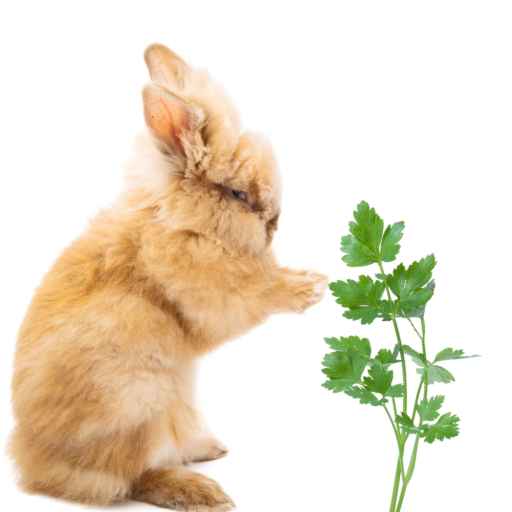
You might recognize Italian parsley as the herb commonly used to garnish your favorite pasta dishes, but did you know that rabbits can also enjoy this flavorful herb?
Italian parsley has a similar nutritional profile to other types of parsley and is packed with vitamins A, C, and K. Additionally, it contains antioxidants that help boost immune function and folic acid, which supports healthy cell growth.
When feeding your rabbit Italian parsley, be sure to follow the same guidelines for serving flat-leaf or curly leaf varieties. One to two cups per every six pounds of weight is recommended for rabbits between one and five years old. Senior rabbits may have different dietary needs, so it’s best to consult with a veterinarian.
Always make sure that any new food given to your rabbit is introduced slowly in small amounts to avoid digestive upset or diarrhea. With proper moderation and care, including Italian parsley in your rabbit’s diet can be a tasty supplement to their main meal of hay.
Curly Parsley
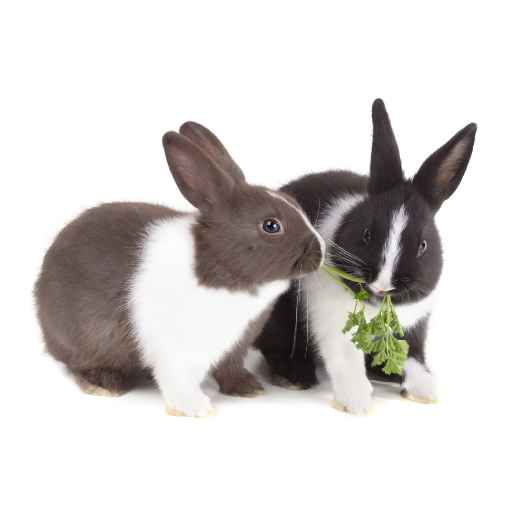
If you’re looking to add some variety to your pet’s diet, curly parsley might be a great option! Like flat-leaf parsley, it contains essential vitamins and nutrients that are beneficial for rabbits.
Curly parsley is also easy to find in most grocery stores and can be grown at home, making it a convenient choice for rabbit owners.
Curly parsley is known for its crisp texture and slightly bitter taste. It’s important to note that while rabbits can eat both the stems and leaves of curly parsley, the stems can be tougher than those of flat-leaf parsley.
As such, you may want to chop them into smaller pieces before feeding them to your pet. Additionally, remember that like with any new food, it’s best to introduce curly parsley gradually and monitor your rabbit’s reactions.
Chinese Parsley
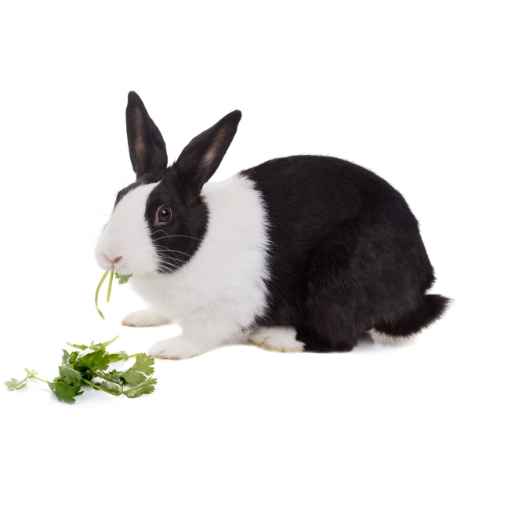
You may know Chinese parsley better as cilantro, and while it’s safe for your bun to consume in moderation, it shouldn’t make up a large portion of their diet.
Like many herbs, cilantro contains essential vitamins and minerals such as vitamin C, calcium, and iron that are beneficial to rabbits.
However, feeding them too much can cause digestive issues such as diarrhea or bloating.
While some rabbits may enjoy the taste and smell of cilantro, it’s important to remember that vegetables should only make up 10% of their overall diet.
It’s also recommended to introduce new foods slowly and in small amounts to avoid upsetting their digestive system.
Other green herbs such as basil or mint can be offered as a supplement to hay-based meals.
Always consult with a professional if you have any concerns about your rabbit’s diet or health.
Providing a balanced and varied meal plan will ensure that your bunny remains happy and healthy for years to come.
Parsley Stems
If your bunny is looking for a tasty and nutritious snack, don’t overlook the often forgotten parsley stems – they can be just as beneficial as the leaves!
Parsley stems contain high levels of fiber which is essential for maintaining healthy digestion in rabbits. Additionally, they are rich in vitamins A, C, and K which help maintain healthy eyesight, support immune function, and promote blood clotting respectively.
When feeding your rabbit parsley stems, it’s important to wash them thoroughly to remove any dirt or pesticides that might have accumulated on them. Cut them into small pieces so that they’re easier for your bunny to nibble on.
It’s also essential to ensure that you don’t overfeed your rabbit with too many parsley stems at once since it can cause diarrhea. As always, consult with a veterinarian before introducing anything new into your rabbit’s diet to ensure their safety and well-being.
Types of Parsley to Avoid
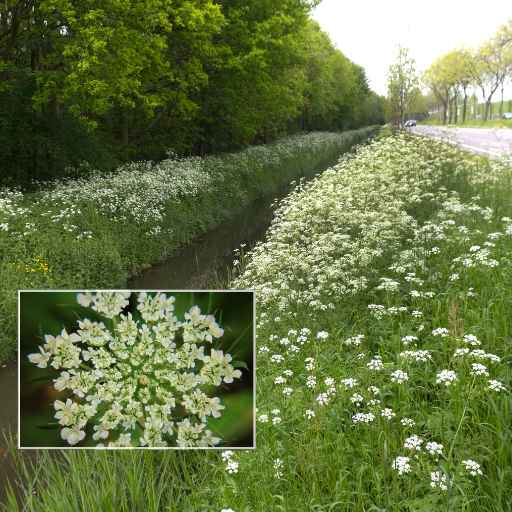
Cow Parsley
Also known as wild chervil, cow parsley is a plant that grows in the countryside and along roadsides.
It’s not recommended for rabbits to eat. Cow parsley can contain toxins that are harmful to rabbits, causing digestive issues such as diarrhea or even poisoning.
To keep your rabbit safe and healthy, it’s best to stick with familiar greens like flat-leaf and curly leaf parsley.
If you’re looking for other green herbs to supplement their diet, basil is a good option.
Remember to always consult with a professional if you have any questions about your rabbit’s dietary needs or if they experience any health issues related to their food intake.
Dried Parsley
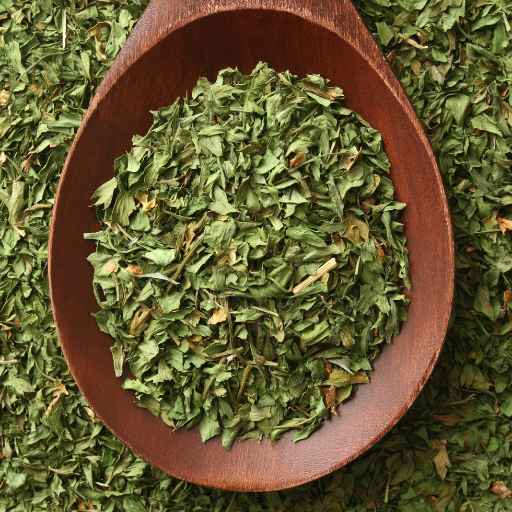
Dried parsley may not be the best supplement for a bunny’s diet due to the lack of essential nutrients that are present in fresh parsley. While rabbits can eat dried parsley in moderation, it doesn’t provide the same level of vitamins and minerals as fresh parsley does.
The drying process of the herb removes some of its nutritional value, making it less beneficial for your bunny. If you want to give your rabbit a treat, opt for fresh parsley instead. Not only is it more nutritious, but rabbits also enjoy munching on its leaves and stems.
Three reasons why dried parsley isn’t ideal for rabbits:
- Drying removes some nutrients: Dried herbs lose some essential vitamins and minerals when compared to their fresh counterparts.
- Risk of contamination: Since dried herbs have been stored longer than fresh ones before reaching consumers’ hands; there is an increased risk of bacterial growth or mold development during storage.
- High sodium content: Some brands may add salt as a preserving agent while drying herbs like parsley; this increases the sodium content in dried parsley which can lead to dehydration if consumed excessively by bunnies who don’t drink enough water daily.
Conclusion
It’s clear that fresh parsley is the preferable option for supplementing a bunny’s diet due to its high nutritional value and hydrating properties. While dried parsley may seem like an easy alternative, it lacks the same water content and can be difficult for rabbits to digest. Additionally, dried parsley may lose some of its beneficial nutrients during the drying process.
Feeding your rabbit fresh parsley as a part of their balanced diet can provide numerous health benefits such as aiding digestion, boosting their immune system, and promoting healthy fur growth. However, moderation is key when it comes to feeding rabbits any type of greens.
Always consult with a veterinarian or rabbit expert before making significant changes to your pet’s diet and carefully monitor their reactions to new foods. With proper care and attention given to your bunny’s dietary needs, they will thrive happily on a variety of healthy greens including delicious fresh parsley!

